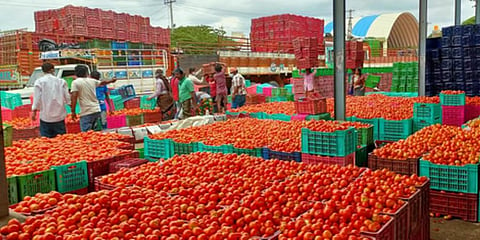

DHARMAPURI: Heeding to persistent demands from farmers, the district administration is conducting a study to explore the possibility of producing Value-Added Products (VAP) like ketchup and sauce from tomatoes grown in the district. Over 12,000 hectares of tomatoes are cultivated in the district.
The study was ordered by Collector R Sadheesh last week. Deputy Collector Sowndarya and Deputy Director of Agriculture Marketing Department Fathima and horticulture officials to study the feasibility of establishing tomato-based industries in Palacode.
Speaking to TNIE, P Ganeshan, a trader from Palacode, said, “Tomato is an erratic crop. At its peak, it could fetch Rs 120 per kg and could crash to even Rs 1 per kg. On average, 1 kg is sold for Rs 20 per kg. So farmers had been requesting the state government to create an industry that would create value-added products. Officials spoke with farmers and traders and gathered data for this.”
Deputy director of horticulture, Fathima said, “Tomatoes grown in Dharmapuri are unsuitable for producing sauce or ketchup as they have low sugar content and are highly acidic. Ketchup requires high sugar and low acidic values. Preparing ketchup from locally grown tomatoes can be an expensive process and the returns would not be worth the production. Tomatoes required for the ketchup cannot be grown here due to unfavourable climate conditions.”
Officials in the agriculture marketing department said, “Low returns are a concern for tomato farmers. However, this is because of the lack of crop rotation. While setting up an industry would be beneficial, it is difficult for the industry to sustain itself. During the glut, when the price falls to Rs 1 or Rs 2 per kg, the industries would benefit. But what happens when the price soars to Rs 90 or Rs 100 per kg? Will the farmers sell at low prices then? We are considering all these aspects. A report would be sent to authorities soon.”